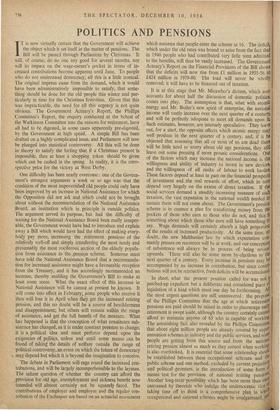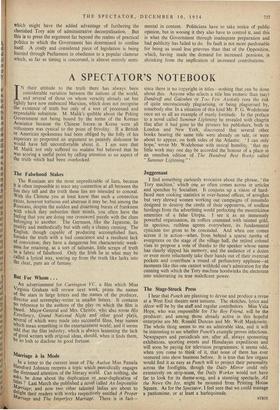POLITICS AND PENSIONS
IT is now virtually certain that the Government will achieve the object which it set itself in the matter of pensions. The Bill will be passed through Parliament by Christmas. It will, of course, do no one any good for several months, nor will its impact on the wage-earner's pocket in terms of in- creased contributions become apparent until June. To people who do not understand democracy, all this is a little ironical. The original impetus came from the demand, which it would have been administratively impossible to satisfy, that some- thing should be done for the old people this winter and par- ticularly in time for the Christmas festivities. Given that this was impracticable, the need for all this urgency is not quite obvious. The Government Actuary's Report, the Phillips Committee's Report, the enquiry conducted at the• behest of the Watkinson Committee into the reasons for retirement, have all had to be digested, in some cases apparently pre-digested, by the Government at high speed. A simple Bill has been drafted on a highly complicated issue, and Parliament will now be plunged into statistical controversy. All this will be done in theory to satisfy the feeling that if a Christmas present is impossible, then at least a shopping token should be given which can be cashed in the spring. In reality, it is the retro- spective price for the victory at West Derby.
One difficulty has been neatly overcome : one of the Govern- ment's strongest arguments a week or so ago was that the condition of the most impoverished old people could only have been improved by an increase in National Assistance for which the Opposition did not ask and which could not be brought about without the recommendation of the National Assistance Board, an institution which in principle is outside politics. The argument served its purpose, but had the difficulty of waiting for the National Assistance Board been really insuper- able., the Government would have had to introduce and explain away a Bill which would have had the effect of making every- body pay more, increasing the retirement pensions of the relatively well-off and simply transferring the most needy and presumably the most vociferous section of the elderly popula- tion from assistance to the ,pension scheme. Someone must have told the National Assistance Board that a recommenda- tion for increased assistance might have .a favourable reception from the Treasury, and it has accordingly recommended an increase, thereby enabling the Government's Bill to make at least some sense. What the exact effect of this increase in National Assistance will be cannot at present be known. It will come into effect in February; some people who receive it then will lose it in April when they get the increased retiring pension, and this no doubt will be a source of bewilderment and disappointment; but others will remain within the range of assistance, and get the full benefit of the measure. What has happened is that the conception of what constitutes sub- sistence has changed, as it is under constant pressure to change; it is a political idea and must perforce depend upon the exigencies of politics, unless and until some means can be found of taking the details of welfare outside the range of political controversy, an event on which the future of democracy i may depend but which it is beyond the imagination to conceive.
The debate in Parliament will rage round the increased con- tributions, and will be largely incomprehensible to the layman. The salient question of whether the country can afford the ,provision for old age, unemployment and sickness benefit now intended will almost certainly not be squarely faced. The contributions of employer and employee, and the regular con- tribution of the Exchequer are based on an actuarial assessment which assumes that people enter the scheme at 16. The deficit, which under the old rates was bound to arise from the fact that in 1946 people who had contributed very little were admitted to the benefits, will thus be vastly increased. The Government Actuary's Report on the Financial Provisions of the Bill shows that the deficits will now rise from £1 million in 1955-56 to £424 million in 1979-80. The load will never be wholly removed; it will have to be financed out of taxation.
It is at this stage that Mr. Micawber's dictum, which -nos,/ accounts for about half the discussion of domestic politics, comes into play. The assumption is that, what with atomic) energy and Mr. Butler's new spirit of enterprise, the national income will vastly increase over the next quarter of a century, and will be perfectly adequate to meet all demands upon it • Such estimates, however, are intensely speculative. They leave out, for a start, the opposite effects which atomic energy maY well produce in the next quarter of a century, and, if it bO objected that assuming that all or most of us are dead there will be little need to worry about old age pensions, they still leave out some pressing if more prosaic considerations. One of the factors which may increase the national income is the willingness and ability of industry to invest in new devices, and the willingness of all ranks of labour to work hardd These factors depend at least in part on the financial prospectS of investment and the real rewards of effort, which in titre depend very largely on the extent of direct taxation. If thd social! services demand a steadily increasing measure of sucb taxation, the vast expansion in the national wealth needed tO sustain them will not come about. The Government's pension scheme is in essence a plan for transferring money from the pockets of those who earn to those who do not, and this 1$ something about which those who earn will have something tO say. Wage demands will certainly absorb a high proportion of the results of increased productivity. At the same time, nO doubt, the new Malthusian law by which expectation cog' staritly presses on resources will be at work, and our conceptioq • of subsistence will always be in process of being rcNisce upwards. There will also be some more by-elections in the next quarter of a century. Every increase in pensions may h° accompanied by an increase in contribution, but since contrl' butions will not be retroactive, fresh deficits will be accumulated!
In short, what the present position called for was not patched-up expedient but a deliberate and considered piece 0,1 legislation of a kind which must one day be forthcoming. AI the most urgent questions are still unanswered : the proposal of the Phillips Committee that the age at which retiremeet pensions are paid should be raised in order to discourage earl): retirement is swept aside, although the country certainly cannol afford to maintain anyone of 65 who is capable of working' The astonishing fact also revealed by the Phillips Committee, that about eight million people are already covered by super' annuation schemes in industry and the public services, and sotej people are getting from this source and from the nation retiring pension almost as much as they earned when work J1 also overlooked. It is essential that some relationship shoo!. be established between these occupational schemes and ,111 public scheme and one method, excluded by current prejudlk:ei and political promises, is the introduction of some form means test for the provision of national retiring pensiom; Another long-term possibility which has been more than oeci canvassed by theorists who indulge the undemocratic \ taking time off to think is a comprehensive plan in w! occupational and national schemes might be amalgamated..0 Which might have the added advantage of furthering the cherished Tory aim of administrative decentralisation. But this is to press the argument far beyond the realms of practical Politics to which the Government has determined to confine itself. A costly and considered piece of legislation is being hurried through Parliament in obedience to a popular clamour Which, as far as timing is concerned, is almost entirely senti- mental in content. Politicians have to take notice of public opinion, but in wooing it they also have to control it, and this is what the Government through inadequate preparation and bad publicity has failed to do. Its fault is not more pardonable for being as usual less grievous than that of the Opposition. which, having made the demand for increased pensions, is shrinking from the implication of increased contributions.









































 Previous page
Previous page